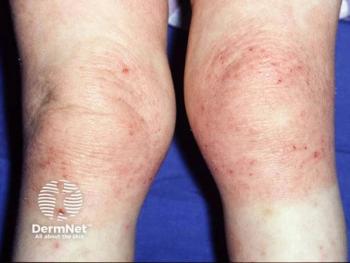
FDA approves Tralokinumab-Idrm for AD
Leo Pharma has announced the FDA approval of tralokinumab-Idrm (Adbry; Leo Pharma) for the treatment of moderate-to-severe atopic dermatitis in adults 18 years or older. Jonathan Silverberg, MD, PhD, MPH, associate professor of Dermatology at George Washington University School of Medicine and Health Sciences, and tralokinumab clinical trial investigator gives his comments on this approval.
LEO Pharma announced that tralokinumab-ldrm (Adbry; Leo Pharma) has been approved for the treatment of moderate-to-severe atopic dermatitis (AD) in adults 18 years or older whose disease is not adequately controlled with topical prescription therapies or when those therapies are not advisable.1 This makes tralokinumab-ldrm the first FDA approved biologic that specifically binds to and inhibits the interleukin (IL)-13 cytokine.
"Today’s FDA approval of Adbry is a major milestone for LEO Pharma and for the millions of people living with moderate-to-severe AD who struggle to find effective control for this chronic and debilitating disease,” said Anders Kronborg, Chief Financial Officer and acting Chief Executive Officer of LEO Pharma A/S. “As our first biologic in the US, Adbry signifies important progress in our mission of advancing the standard of care in medical dermatology.”
This approval is based on the safety and efficacy results from the ECZTRA 1 (NCT03131648), ECZTRA 2 (NCT03160885), and ECZTRA 3 (NCT03363854) phase 3 trials, which included nearly 2,000 adult patients with moderate-to-severe AD.1 Safety data was evaluated from a pool of 5 randomized, double-blind, placebo-controlled trials, including ECZTRA 1, 2 and ECZTRA 3, a dose-finding trial, and a vaccine response trial.1
All the trials had tralokinumab-ldrm 300 mg treatment every other week alone or with topical corticosteroids (TCS) as needed and met the primary endpoints at week 16 as measured by an Investigator Global Assessment (IGA) score of clear or almost clear skin (0/1) and/or at least a 75% improvement in the Eczema Area and Severity Index score (EASI-75). The secondary endpoint was reduction of weekly average Worst Daily Pruritus NRS of 4 points or more on the 11-point itch NRS.
The trials found the adverse events (AEs) with active treatment was comparable with placebo, with the most comms AEs (incidence equal to ro greater 1% than placebo) being upper respiratory tract infections (mainly reported as common cold), conjunctivitis, injection site reactions, and eosinophilia.1
“AD can be severe and unpredictable, which makes it not only challenging for patients to achieve long-term disease control, but also for clinicians to treat, since there are limited treatment options for this burdensome chronic skin disease,” said Jonathan Silverberg, MD, PhD, MPH, associate professor of dermatology at George Washington University School of Medicine and Health Sciences, and tralokinumab clinical trial investigator. "Adbry will be an important addition to our therapeutic armamentarium as a treatment designed to specifically target and neutralize the IL-13 cytokine, thereby, helping patients manage their atopic dermatitis.”
Tralokinumab-ldrm will be available in a 150 mg/mL prefilled syringe for subcutaneous injection with an initial dose of 600 mg followed by 300 mg every other week, according to the release. A dosage of 300 mg every 4 weeks may be considered for patients below 100 kg who achieve clear or almost clear skin after 16 weeks of treatment.
“For people living with atopic dermatitis, the experience goes beyond the skin, often impacting important psychosocial aspects of their life,” said Julie Block, President and CEO of the National Eczema Association. “It’s exciting to see a new targeted therapeutic option for adult patients living with moderate- to-severe atopic dermatitis. Therapeutic advances like this provide much needed hope for those who may have spent years struggling to find an effective therapy to alleviate the burden of this disease.”
Listen to what Silverberg said in the video below.
Reference:
1. LEO Pharma announces FDA approval of Adbry (tralokinumab-ldrm) as the first and only treatment specifically targeting IL-13 for adults with moderate-to-severe atopic dermatitis. Press Release. Published online December 28, 2021. Accessed Decemeber 28, 2021.
Newsletter
Like what you’re reading? Subscribe to Dermatology Times for weekly updates on therapies, innovations, and real-world practice tips.











